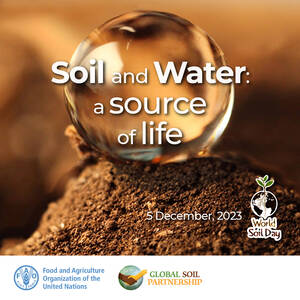December Spotlight on Soil: World Soil Day, 4 per 1000 Day, and Food, Agriculture & Water Day at COP28

From November 30 to December 12, global leaders, private sector and civil society came together for the United Nations Climate Change Summit COP28 in Dubai. This year, the conference program featured thematic days highlighting salient areas of the climate change debate and agenda. For the first time, there was a day dedicated to the intersection of climate change and health and on December 10th, environmental activists, scientists, corporate leaders and farmers recognized “Food, Agriculture & Water Day“. There were more sessions than ever focused on the role of food and agriculture in climate change and the growing support to accelerate carbon sequestration through healthy soils and mitigate the negative impacts of the food system.
Concurrently with the Summit and a few days after World Soil Day, members of the regenerative agriculture movement and the 4 per 1000 network gathered for the 8th annual “4 per 1000 Day” on December 6th, with high-level participation from ministers of agriculture and leaders attending COP 28.
The “4 per 1000 Day” brought together supporters and members of the 4 per 1000 initiative who are focused on soil health and sustainable agriculture to address climate change through global collaboration. The 4 per 1000 initiative aims to elevate soil health on the international agenda and this all-day event on the sidelines of the Climate Summit featured high-level discussions, presentations, and sessions covering impact measurement tools, regional conferences’ outcomes, scientific updates, and stakeholder group discussions. The 4 per 1000 initiative encourages nations to adopt practices that promote soil health, carbon sequestration in soils and agroecology, emphasizing the critical role of agriculture in mitigating climate change.
The intricate interplay between agriculture, water resources, and food production became apparent as COP28 participants engaged in discussions and actions that aimed to transform how we approach these interconnected challenges. Discussions spanned topics such as integrating water and food system management, promoting sustainable aquatic foods in school meals, addressing methane emissions in agriculture, and advocating for climate-resilient saline agriculture. COP28 recognized the urgency of addressing food security sustainably while ensuring that food production practices align with environmental conservation, biodiversity and climate resilience goals.
COP28 also marked a significant global development with 134 countries signing a groundbreaking Declaration on Sustainable Agriculture, Resilient Food Systems, and Climate Action urging the implementation of national action plans to revolutionize the production, transportation, and consumption of food as part of climate action. While the declaration does not specify support for smallholder farmers and overlooked areas of concern in industrial farming, it signaled the importance of agriculture and food systems in future climate negotiations. Acknowledging the critical roles of soil health, regenerative agriculture, and food systems transformation in achieving the Paris Agreement Goals is a crucial step toward a more sustainable and resilient future.
The convergence of World Soil Day, 4 per 1000 Day and Food Agriculture & Water Day at COP28 underscored the interconnectedness of soil health, agriculture, water and food systems in securing a more sustainable future. These moments served as mobilizing points for the global community, advocates, policymakers, and stakeholders to push for policies that prioritize sustainable agriculture practices.

